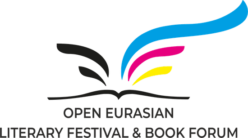
Страна: Украина
Катерина Гладка- украинская поэтесса, писательница, журналистка, публицистка, сторителлер. Сколько себя помню в фокусе моего внимания были вопросы вечности, меня всегда интересовало для чего мы сдесь и куда идем, как мы познаем себя и Бога, хто мы в своей Сути. Этот вектор проходит насквозь через мои статьи, тексты, авторские курсы, проэкты. Я мост между мирами, между культурами. Сейчас в моем послужном списке десяток конкурсов, я соавтор 2 документальных книг и 1 сборника малой прозы. Текст для меня-это способ смотреть на мир. Меня интересует новая роль моей страны в мире, междисциплинарное искусство, глубиные практики ( медитация, отдельные буддиские техники, хилинг). Я создаю сообщество людей, которых называю «городским племенем» и я знаю, что мне интересны творцы, котроые проснулись всредине своей жизни.
Country: Ukraine
Kateryna Gladka- Ukrainian poet, writer, journalist, storyteller. For as long as I can remember, the focus of my attention has been questions of eternity, I have always been interested in why we are here and where we are going, how we know ourselves and God, who we are in our Essence. This vector runs through my articles, texts, author’s courses, projects. I am a bridge between worlds, between cultures. Now I have a dozen competitions on my track record, I am a co-author of 2 documentary books and 1 collection of short prose. Text for me is a way to look at the world. I am interested in the new role of my country in the world, interdisciplinary art, deep practices (meditation, individual Buddhist techniques, healing). I create a community of people that I call «urban tribe» and I know that I’m interested in creators who woke up in the middle of their lives.
Отрывок из новеллы “Переход”
1
Her wheat-colored hair fluttered in the wind, occasionally covering her eyes. A stranger captured a moment near the entrance of the zoo, where he held Carolina in his arms, and perhaps for the first time in her life, she felt seen by him. Carolina is me, the little blonde girl at the photo, finally held in my father’s arms.
Being the daughter of a former Soviet military man meant not having the right to feelings, because that’s how my father always was. Growing up in this atmosphere, I began to realize how closed off this man, who called himself my father, truly was. In this photo from the zoo, I am five years old and happy, clearly visible to the naked eye. And how did this photo end up years later in a pile of papers, tucked away in an old notebook on a mostly chaotic table?
Oleg Ivanovich was a serious man because it was a universal mask that simultaneously conveyed a sense of importance, status, and emphasized masculinity. My father suppressed his authority and did not allow weaknesses, neither in himself nor in others. An ideal hiding place behind external toughness. Even as a child, I picked up on every micro-emotion of my father, every gesture of warmth, as if reassuring myself that he was alive, warm, and human.
Today, the wind was just as strong, and I adjusted the strand of hair that stubbornly fell onto my face. It seemed as if it tried to hide me from the picture I saw around me. In a circle stood about fifteen people: men and women, my father’s friends, former colleagues, his new wife, classmates. Everyone was silent, looking toward the center of a small plot where two strong men were digging a hole in the unyielding ground.
I have always liked the cemetery since childhood. I had visited it many times and walked among the old tombstones. I never felt fear or anything threatening there; on the contrary, I felt peace, certainty, and even curiosity. And now I stand here again. My father had a plot prepared for himself, passed down from my grandfather. And this opportunity to die had finally come. Death spares no one.
I stood behind everyone, as if trying to distance myself, to build a barrier between myself and the others. One of my father’s old friends from his youth took the floor—a tall man, with almost completely gray hair, struggling to hold back the emotion that was about to surface on his face. It seemed that even in my father’s circle, it was customary to hold everything back.
-I know it’s difficult to find words right now. Oleg was our friend, a close person to us at different stages of life. It is true what they say, that one can never be prepared for death.
The two men in the circle nodded their heads synchronously at this phrase. On a young birch tree growing near the neighboring plot, a large crow settled, as if attentively listening to the speech.
-He accomplished so much, continued my father’s friend. A tourist, talented in engineering, but above all, a good person, a friend, a father, and even a grandfather.
I started to feel a bit queasy at the mention of a good person, a friend, and a father. It reminded me of when I first encountered death, when I saw how they buried one of my mother’s coworkers when I was still a child and couldn’t understand why, when a person dies, they often attribute qualities and characteristics to them that they didn’t possess in life. I also couldn’t understand why they put makeup on the deceased, as if they wouldn’t accept them on the other side without it.
Memories of that first encounter with the topic of death disconnected my attention from the present, and I «woke up» only when the speech was already finished and they began to lower the coffin into the ground. And in that moment, it felt like I would never see that body, that physical form, again. How strange it is to realize that. He was my father, he was present at my birth, and now he is dead. Or his body dead ?
Marina, my father’s new wife, stepped forward and in a somewhat dramatic manner, as it seemed to me, she sobbed and threw a handful of earth onto Oleg’s coffin, which slowly descended on ropes.
-Now, according to the laws of the genre, she should still say: whom did you leave us for?- I thought to myself. And as if intercepting that thought, Marina looked at me and didn’t take her eyes off me for several seconds.
2
My father met my mother in their distant student years. As students at the Kyiv Polytechnic Institute, they were beautiful, adventurous, charismatic, and not too immersed in the Soviet gray reality, so they quickly found a common ground. Dad, or simply Oleg back then, had told me multiple times how he first invited Mom on a date. It couldn’t really be called a date; he simply showed up on time in the corridor near the women’s changing room after a hiking section and offered to walk her home. At that time, many young people found excitement and an escape from reality through activities in the hiking section and preparation for mountaineering. Olga reacted jokingly:
-And will you now accompany me like this every time?
-Why not?- he replied. Consider it like orienteering.
-You’re funny, Oleg. Why did I suddenly catch your attention? And don’t say ‘why not’?
-Why not?- he answered.
They both laughed, and he indeed started escorting her home almost every time, which, of course, sparked gossip among the hikers, suggesting that Oleg had fallen for Olga. They began to meet in a very puritanical manner in the eyes of the outside world: they could hold hands, occasionally exchange a kiss, mostly on the cheek, but in their own world of love, everything happened quite differently. Maneuvers between dormitory rooms, outings into nature, movies, tender touches, and the sense of liveliness in their lives.
In the institute section, there were almost an equal number of girls and boys, mostly of the same age, with a few older students. Among them was Victoria, strict and always impeccably organized. She didn’t have exceptional oratory skills and initially repelled others with her cold demeanor and character. At that time, having an apartment, which was an incredible wonder in those days, could easily classify one as part of the privileged Communist youth. The availability of housing not only spoke of a person’s financial situation but also meant that apartments weren’t just handed out to anyone. Perceptive students mostly understood this. Vika had a goal, or perhaps society had a goal for Vika. It was simple — it was time to get married.
Once, my father had another date with Olga (my mother), and they took a long walk in the huge park near the institute. Olga felt that something was unusual that evening, and Oleg seemed nervous.
-Olen’ka, would you become my wife?- he suddenly blurted out.
No preparations, no «right moment.» It seemed like he was taking a leap of faith, standing on the edge of a cliff. It startled Mom. She was still very young and not ready for the classic set of life events. She felt that she wanted to experience so much more, discover new heights, but most importantly, feel it. Can I, her daughter, say that they weren’t strong enough? Probably not. After all, that’s how I was born. But she definitely wasn’t prepared to hear that phrase in the park at that moment.
-Oleg… darling… you… um… I’m a bit shocked,- she tried to smile, but it came out somewhat nervously. I can’t give you an answer right now…
Something seemed to drop in his heart. He took Mom’s words literally as a refusal. He blushed and became bewildered. And Olga, too, didn’t know what else to say. The date ended abruptly, and a few people strolling along the park alley, as if knowing something, cast glances at the young man who hurriedly made his way home. Olga felt embarrassed and couldn’t understand why he decided to say all of that so spontaneously.
It must be said that my dad was the king of drama since his youth. Even when it seemed like he had grown up, this trait stubbornly remained in his character: he didn’t give people a chance to explain or clarify what they meant. He drew his conclusions and acted impulsively.
Once, over a cup of coffee, I tried to ask him about this episode in his life and what had happened, how he viewed it. But over the years, he became offended and blamed my mother for her reaction, never once asking if it was truly a refusal.




 (2 оценок, среднее: 5,00 из 5)
(2 оценок, среднее: 5,00 из 5)![]() Загрузка…
Загрузка…

